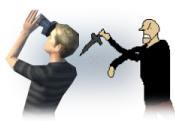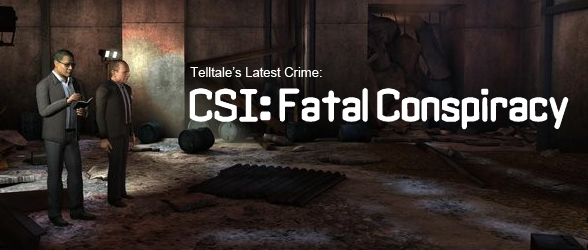Now in its 11th season, CSI: Crime Scene Investigation is the kind of massively watched television series for which a copyright owner can regularly churn out video game tie-ins with every expectation of collecting easy, risk-free returns. You have to give CBS and Ubisoft some credit, then, for making a genuine attempt to capture the soul of the show in their successful game adaptations, an aspiration that was never better served than when Telltale Games was given the reigns to the franchise as developer. You won’t find much evidence of appreciation in the scores routinely awarded to these games by mainstream gaming sites, but for people who have a denser background in the CSI TV show than they do in video games, or who are simply capable of recognizing that some titles have different aims than others when it comes to accessibility, CSI: Fatal Conspiracy, the fourth collaboration between Ubisoft and Telltale, delivers an engaging experience every bit as compelling as the previous three. I’d even go as far as to say that reviewing a game like this, where the people inside and outside of the targeted group can be so easily self-identified, is utter folly. Let’s get to it!
Telltale has always wanted to be viewed as the gaming equivalent of a television studio, and the metaphor is definitely more apt with this franchise (which continues to be their only conventional publisher-developer relationship) than any other they have worked on. The gameplay and even technology remain almost identical across installments, with the differences manifesting themselves in the form of new stories, the occasional cast shake-up, very gradual technical evolution, and a new minor gimmick or two. It’s pretty much exactly the kind of changes you’d expect to find between seasons of a TV show, and no more.
Indeed, with Fatal Conspiracy I didn’t notice enough of a change in the overall formula to really write about – you will scour crime scenes, interrogate suspects, and process evidence in more or less the exact same way that you expect, and probably want, if you’re already coming to this investment as an established follower.
There’s always been some attempt, however minor, to connect the last case in these five-case games with previous ones in some way, but this time around the way the mysteries are connected is a bit more ambitiously handled - comparisons with the increasing less standalone nature of the episodes within Sam & Max seasons are not entirely unjustified.
Telltale presents a chaperone for their background narrative in an original character named Gene Huntby, an FBI agent whose quest to take down a Mexican crime matriarch, the so-called “Queen of the Hive,” has a way of interleaving with your own cases. It’s not the most layered execution the world has ever seen, but the overarching plot does wrap up nicely enough by the end, and is a welcome expenditure of whatever currency these things run on. The individual cases - twisty, stylized whodunits - live up to the standard of the previous games, and Telltale has once again enlisted official CSI scribes for assistance in generating plots and dialog. Having always found the more “mundane” stories in these games to be the most interesting, I was most fond of the third case, titled “Tapped Out,” which concerns the death of an heiress at a lakeside chalet where she was receiving palliative care. The game’s creatively bizarre homicides and often hammy dialog are, I’m sure, authentic to the show, which is certainly more about entertainment than realism, and I don’t think any fans will have qualms with the writing. The game is successful in making you feel like the forensics experts you see on TV; making the simulation any closer to real-life would have probably been a failing (and, I assume, a drag).

Both visuals and sound are in-line with what you’ve seen in Telltale’s previous three excursions with the license. The eerie environments are detailed and pack the aura of manufactured gloominess, with every building in Vegas characterized by dim light sources that seem to be more concerned with casting sinister shadows than providing pervasive illumination.
The 3D first-person perspective makes exploring locations for evidence more fun than your static pixel-hunter, and the camerawork during non-interactive bits exhibits Telltale’s ever-increasing professionalism in that arena. Character models continue to get the job done, with their detail and lip-synching being on-par with Deadly Intent to my eyes. The audio, perhaps the more important element in these games, also follows suit with the entry’s predecessors. The voice acting is solid, with the same cast members from the show who threw in with the previous games reprising their roles here. The Bay Area talent that rounds out the rest of the game’s cast are at least as good as the onscreen performers - the ubiquitous Andrew Chaikin, forever typecast in these games as physically abusive lovers, is easily recognizable in a number of roles. The highly ambient music, mostly taken from the show and rearranged to maximum effect by Jared Emerson-Johnson (whose fellow wizards at BA Sound do their superb, unsung thing), plays a critical role in the moodiness that characterizes these games and makes them such fun experiences, especially when played in a darkened room with the speakers opened up. Under those circumstances, even the best efforts of the gloriously obnoxious Trend Micro product placement struggle to pull you out of the proceedings.
My review copy of Fatal Conspiracy was the Wii version. Having played all of the previous games on PC plus the Wii version of Hard Evidence, I have a pretty good idea of how severely textures have been muddled down in the translation. That said, the visuals of these games have never been about fidelity so much as style and atmosphere, and since the Wii continues to be perfect for the pure point ‘n click control scheme, and Telltale seems to have completely licked the issue of loading times, I was quite pleased with how this effort came out.
Putting aside the abominable Sam & Max ports, Telltale has gotten much better at their Wii conversions over time, and Fatal Conspiracy is the smoothest yet. Ultimately, having made some educated guesses, I can recommend this game for any of the released platforms that you own and prefer. Just note that as always, the Wii version has the superior controls in the console arena with a graphical downgrade, while the Xbox 360 and PS3 versions have the opposite tradeoff; the PC version is, of course, superior to them all.
The CSI series is nothing if not consistent, and Fatal Conspiracy will unquestionably satisfy its target audience as the enjoyable timewaster that it is, taking its place in a line-up we’ve been conditioned to count on incrementing every year to year and a half. Hopefully, Telltale continues to be Ubisoft’s preferred choice for the license, as their trademark cinematic take makes the games feel as close to an interactive episode of a TV show as you can really imagine. That’s what Ubisoft is shooting for, and that’s exactly what you get. You should know whether or not you’re in this game’s market by now, and if you don’t, I can certainly call Fatal Conspiracy (demo available) as good a way to find out as any of the other three.
CSI: Fatal Conspiracy is available for PC, Wii, Xbox 360 and Playstation 3 (Telltale’s first disc release for the platform) at a price of $29.99. Next month, Ubisoft is also putting out a companion game for the Nintendo DS called CSI: Unsolved. Like last year’s CSI: Deadly Intent: The Hidden Cases, this is a distinct product that has nothing to do with Telltale.
View screenshots for this game in our media section.
Jason is currently serving a life sentence for murder at Wallens Ridge State Prison, Virginia. He is allowed to write reviews as part of his rehabilitation program.
